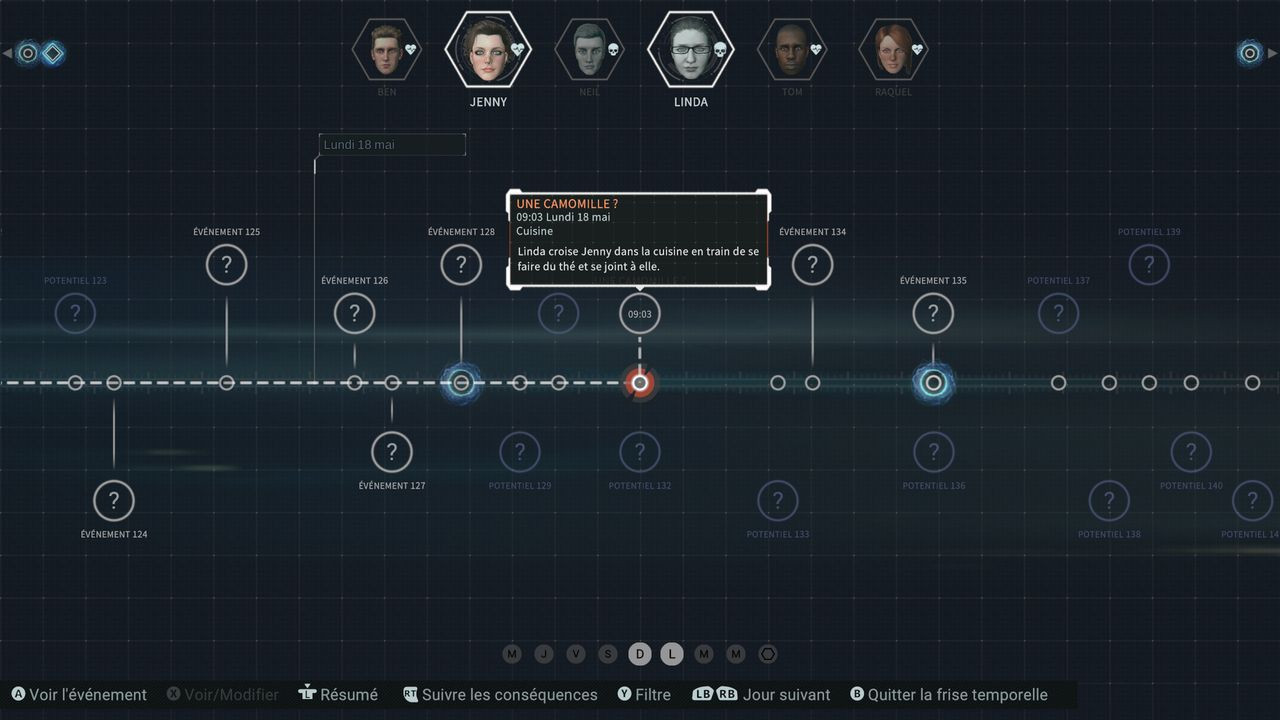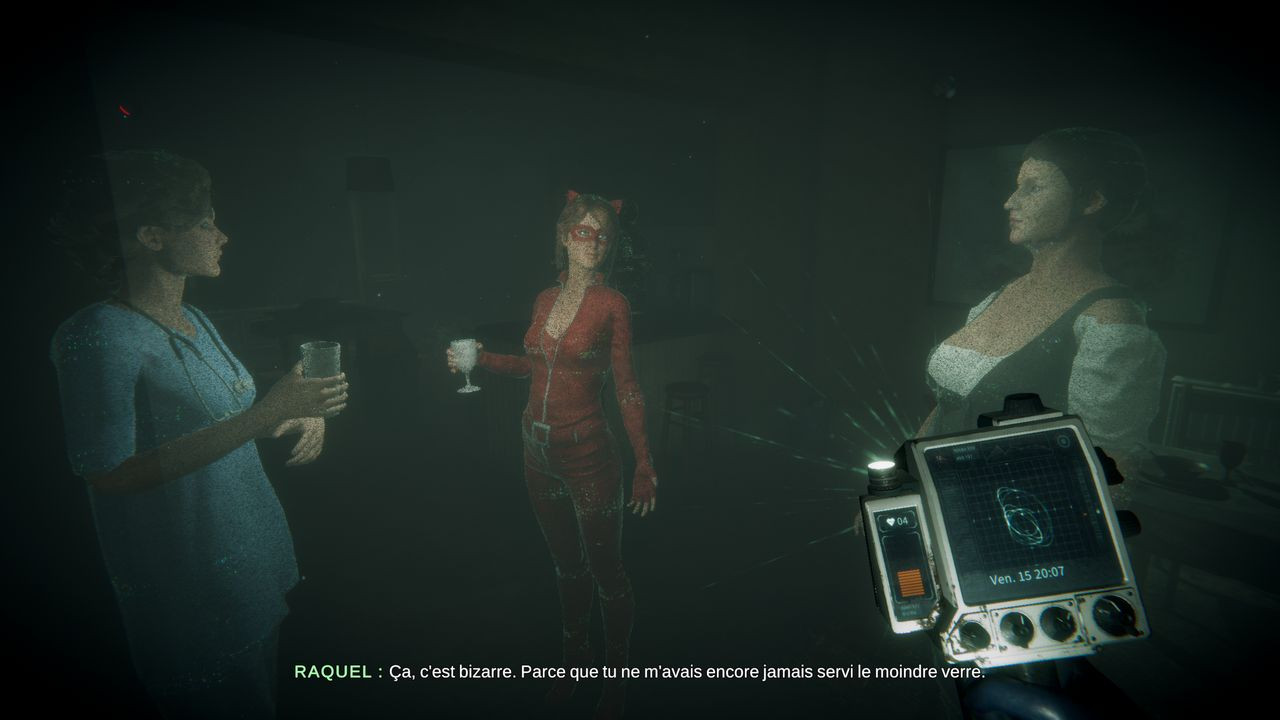Founded in 2015, Cosmonaut Studio took seven years to release its first project. It took two more years for the small team based in Liverpool, with the help of publisher Secret Mode, to manage to release Eternal Threads on consoles. An independent production that takes us on an original journey through time, in a world that fights against the butterfly effect. An interesting concept on paper, but which comes up against the studio's limited resources far too quickly.
Eternal Threads takes us to the near future where a way to travel through time has been discovered. Unfortunately, the numerous temporal escapades have created serious distortions, and a chain of events that should never have happened, until the nuclear catastrophe. To help repair the damage caused, poison sometimes being the remedy, small missions in the past are carried out, but in a homeopathic dose this time. It is in this context that the player plays Agent 43 who, for his very first mission, will have to save six people who died in a building fire set in a small British town several years ago. A rather simple pitch, which sends us into the daily life of Tom, the owner of this shared accommodation, Neil, Ben, Jenny, Raquel and Linda, who has just been welcomed by the rest of the residents.
Advertisement
Agent 43 aims to retrace the main events that took place up to a week before the tragedy, to try to save this entire group of friends. However, there is no question of blending into the group directly. Agent 43 is sent shortly after the fire, and must then delve into the memories of home. The first steps are thus an opportunity to discover the layout of the rooms, arranged on three levels. On the ground floor there is a dining room, a living room, the kitchen and Tom's bedroom, while the upstairs accommodates the other bedrooms as well as the bathroom. Finally, the basement has a games room and a storage room, while a courtyard allows the group to get some fresh air or go grill. The exploration of the house is done in first person view, to a sort of walking-simulator behind closed doors. The playing field is not very big, not to say rather restricted, but the developers had the good idea of not revealing everything at once, by keeping doors closed at the start, behind which we subsequently discovers some mysteries. Still, even with all the rooms accessible, we still quickly got around them.
A somewhat disturbing observation, even if this small, reduced playing field somewhat compensates for the need to make a very large number of round trips. Because the concept of the game takes on its full meaning in its timeline and the events associated with it. In total, nearly 200 important moments are listed, to be viewed using a holographic device capable of reliving the sequences in question, on a given date and specific location in the house. The arrival of Linda in the entrance hall, a harmless discussion around the kitchen sink or a TV evening… We thus relive small moments of daily life, while learning to discover each character in more detail, until we understand what led to the tragedy that led to their death.

The principle of the game is then very simple, on a few events, it is possible to influence the decisions made by the roommates. New branches that are sometimes anecdotal but which most often trigger new events which, potentially, could save the inhabitants. Ultimately, the main mechanics of the game revolve around the management of the timeline, an essential element which lists all the events. It is via this timeline that we can trigger holographic flashbacks, provided of course that we are on the correct timeline. In other words, we will only be able to see Neil thank Ben for lending him his bike… if we got Ben to lend him his bike. It seems silly to say, but we imagine titanic work carried out by Cosmonaut Studio for having built a coherent timeline.
Advertisement
A colossal work which is somewhat reminiscent of what is done on the FMV (Full Motion Video) side. Better yet, if the choices made result in the bike being stolen, it logically disappears from the house. Same thing with the messages received on the phones of the deceased, which evolve according to the decisions taken. To find your way among the 200 or so events, small visual cues allow you to identify those that are linked together, while you can change a decision without having to revisit the sequence you want to modify. A welcome option that allows you to test different combinations and unlock all the sequences. In total, it took us around 6 hours to reach the end of the adventure, with a good ending, but without the roommates all being fully satisfied. Enough to offer a little replayability. And if that seems too substantial, a “simplified” mode reduces the number of choices to make and scenes to viewwhile removing the possibility of seeing the true ending of the game.
An impressive plot construction which unfortunately contrasts with the technical feverishness of the whole. Even if no bugs or slowdowns have been noted, it is above all the poverty of the 3D models and the sloppy decorations (despite a very small house) which disappoint. A disappointment to be credited to the use of the Unity engine, not really known for being eye-catching. Not much to say about the English dubs, with decent acting without being impressive either.
Despite great ambitions, an original scenario and entirely correct writing, Eternal Threads only too rarely succeeds in putting rhythm into this narrative adventure that is ultimately too banal in its execution. We still retain the desire to draw ourselves into the daily life of six people whose lives ultimately do not depend on much, and a rather well constructed frieze despite the complexity of the proposed branches. For the rest, we quickly become annoyed at having to multiply the backs and forths for ultimately not having enough audacity in the unfolding of this story which had good potential at the start.
+
- Some interesting little stories
- Well constructed frieze despite its complexity
- Facilities to modify choices
–
- Technically ultra dated
- House which we quickly toured
- Long lengths, little rhythm
- Constant back and forth
- Disappointing and not very clear ending
